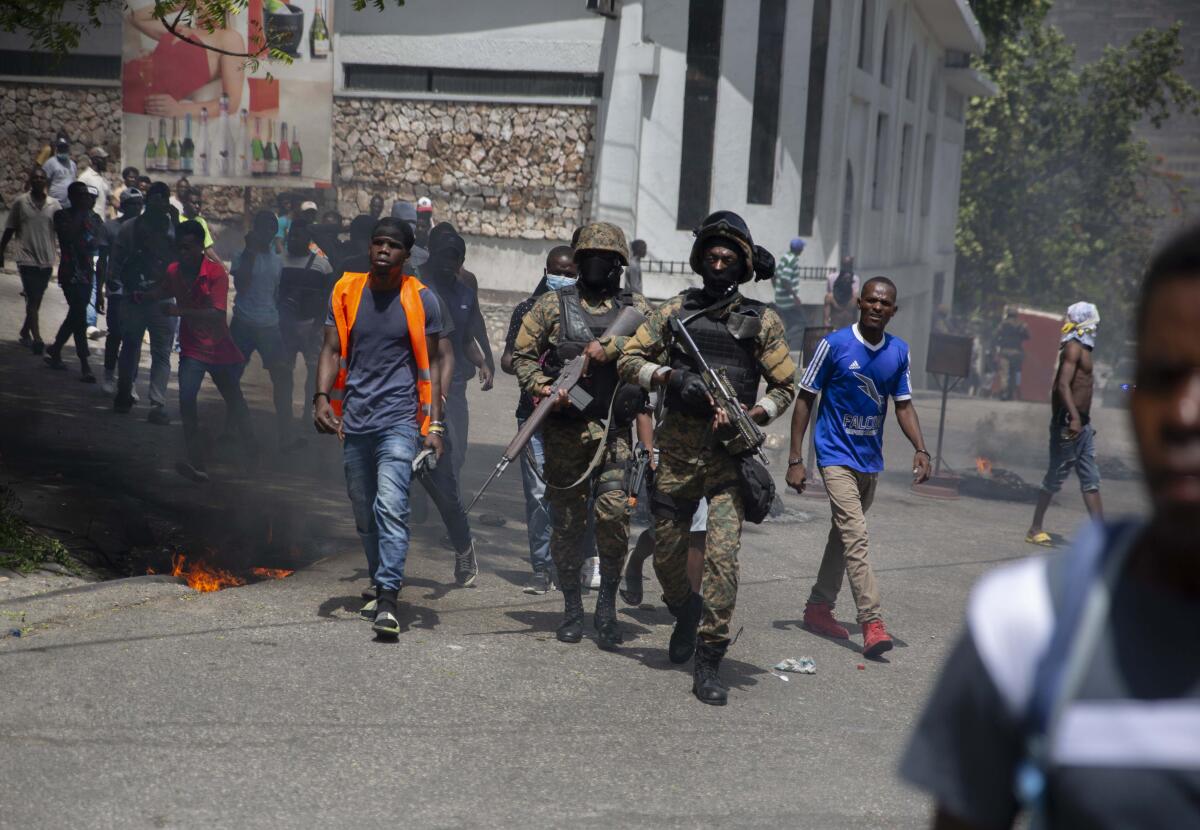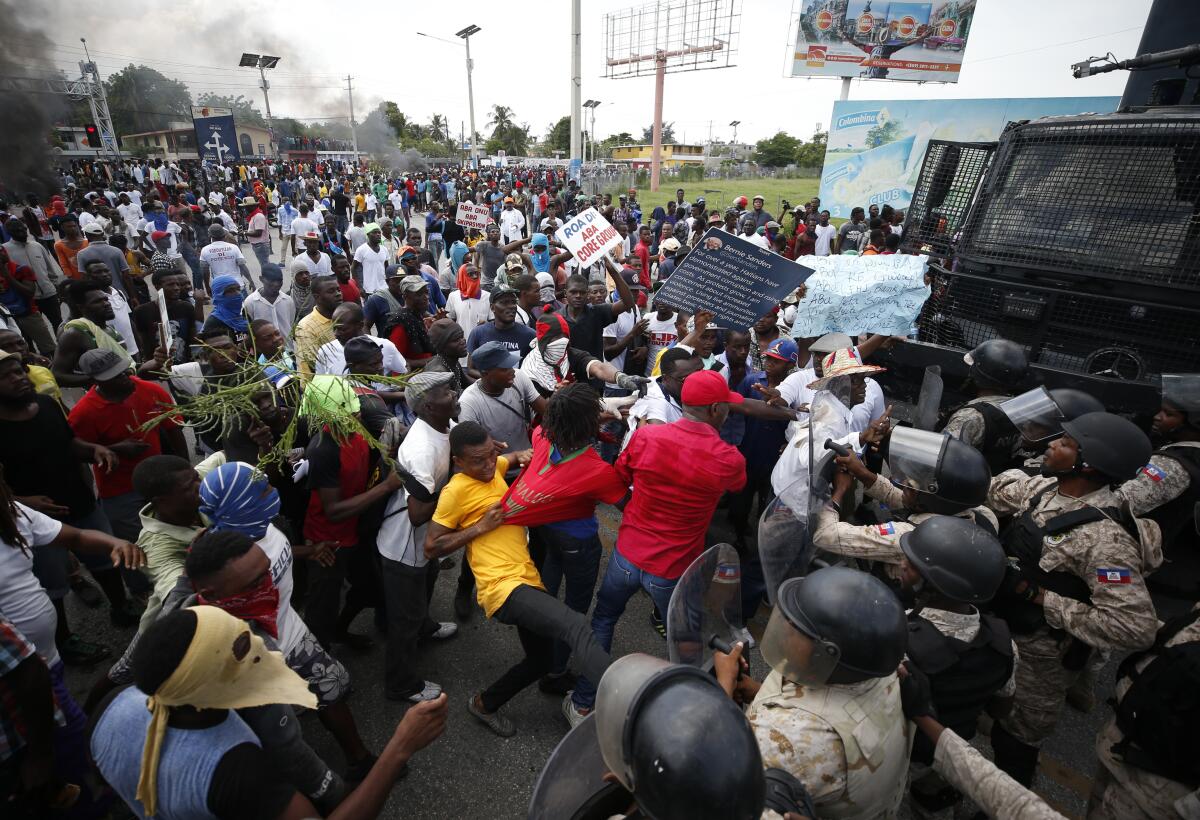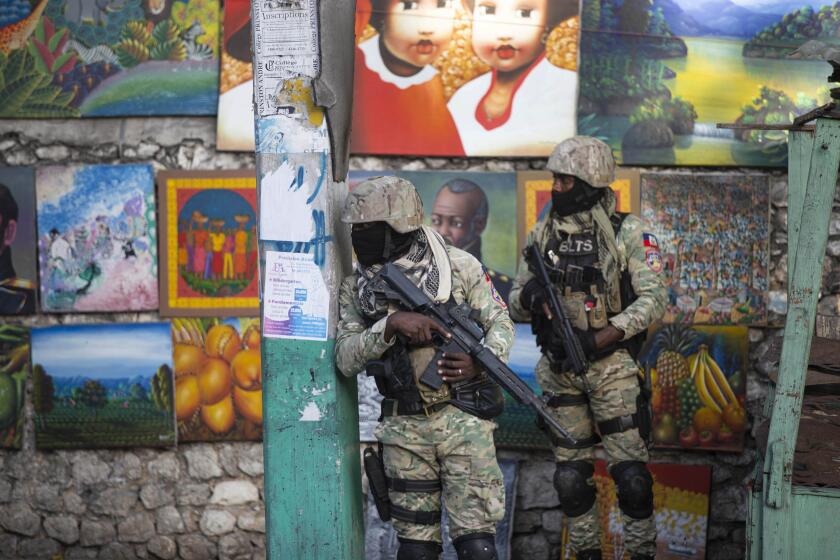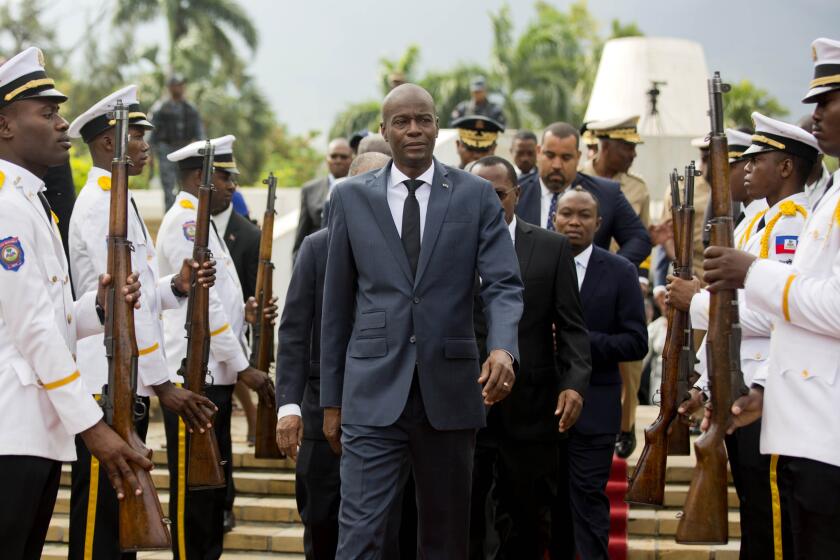Who killed Haiti’s president? Plot thickens as Moise’s guards come under scrutiny

MEXICO CITY — Three days after Haiti’s president was killed inside his home on the outskirts of Port-au-Prince, it’s still unclear who ordered and carried out the brazen hit.
But a convoluted thicket of possible plots has emerged — with some officials blaming the assassination of President Jovenel Moise on a team of well-armed foreign mercenaries and others suggesting that palace guards may have been involved. Evidence has also emerged that the guards and the alleged mercenaries could have worked in tandem — or that the guards or someone else may have set up the foreigners to take the fall.
As officials continued their investigation into the murky circumstances surrounding Wednesday’s early morning killing, Haiti’s constitutional crisis deepened Saturday, with multiple politicians battling for control of the impoverished country and one faction calling on the United States to deploy troops to the island to ensure stability.
Controversial Haitian President Jovenel Moise was killed early Wednesday by unknown assailants. Who will take control of the country now?
Amid the turmoil, some Haitians cautiously returned to the streets after days spent cowering inside.
Fear remains widespread, said Pierre Esperance, executive director of the National Human Rights Defense Network in the capital, Port-au-Prince. But so is the need to earn money and buy food. “People are shocked,” he said. “But they’re focused on surviving.”
Occupying the western third of the island of Hispaniola, which it shares with the Dominican Republic, Haiti is the poorest nation in the Western Hemisphere, with the average person surviving on less than $3 a day.
In recent decades, the former French colony has been besieged by hurricanes, earthquakes, disease, dictatorships and a series of foreign interventions that many believe only fueled ongoing instability.
Even before Moise was killed, the country was engulfed in a series of criminal, political and health crises.
An epidemic of gang violence fueled by guns smuggled from the U.S. had forced thousands of residents to flee. The COVID-19 pandemic was raging, yet not a single vaccine dose had been distributed.
And Moise, who took office in 2017 after a contested vote, had been ruling by decree, despite a legal consensus that his term had expired in February. He had since refused to hold elections, leaving Parliament with just 10 members, too few for a quorum.

Haitians had repeatedly taken to the streets in mass demonstrations calling for his resignation. Still, most were horrified to wake up Wednesday morning to news that Moise had been killed and his wife, Martine, wounded in an attack at their home in an affluent suburb of the capital.
Martine Moise, who is recovering in a Miami hospital, described the siege in an audio recording posted on her Twitter account Saturday.
“In the blink of an eye, mercenaries came to my house and riddled my husband with bullets,” she said, her voice weak. “After 25 years of marriage they took my husband away from me.”
That account has been backed up by Haiti’s national police chief along with interim Prime Minister Claude Joseph, who declared himself in control of Haiti after the killing. They have blamed a group of foreigners detained in the aftermath of the attack — two Haitian Americans and at least 18 Colombians.
The assassination of Haitian President Jovenel Moïse is the Caribbean nation’s latest tumultuous chapter.
The Colombian suspects had been recruited to travel to Haiti by security companies, and most of them were former members of the nation’s armed forces, according to the director of Colombia’s police force. It is common for former soldiers in the nation, well trained in counterinsurgency after decades of battling drug traffickers and guerrilla groups, to work for security firms in the Caribbean and elsewhere in the world.
A Haitian judge who interviewed the detained men told news outlets that the Colombians said they had been recruited by a Florida company to provide security for powerful Haitian families, and that the two Haitian American men had been hired to work as interpreters.
One of the Haitian Americans told the judge that the commandos descended on the president’s home to arrest him, not kill him, and that by the time they arrived on Wednesday, Moise was already dead.
Meanwhile, fresh evidence indicates that the president’s own security team may have been involved in the hit.
For one thing, none of the president’s guards were reported injured in the attack. And records published by the Colombian magazine Semana show that top palace guard Dimitri Herard traveled repeatedly to Colombia in the months before the killing, suggesting he might have been involved in recruiting the alleged mercenaries.
In Haiti, some have speculated that Herard either collaborated with the foreigners in the killing or set them up to take the blame for the assassination, perhaps on orders from someone higher up in the government.
“The president was assassinated by his own guards, not by the Colombians,” prominent opposition politician Steven Benoit told Haitian radio station Magik9 on Friday.
Herard, who is being investigated by U.S. officials on suspicion of arms trafficking, according to a report from the Washington-based Center for Economic Policy and Research, has been asked to present himself for questioning by Haitian authorities along with other members of the president’s security detail.
Joseph, Haiti’s self-declared leader, has also come under new scrutiny, with one high-profile member of the political opposition accusing him of orchestrating a coup.
Joseph was named interim prime minister by Moise in April. The U.N. special envoy for Haiti recognizes his mandate and said he will lead the nation until elections can be held.
But at home, his leadership is contested, with the remaining members of Parliament demanding that he stand down. They say Joseph Lambert, the head of Haiti’s Senate, should take over as president and Ariel Henry be confirmed as prime minister. Moise had named Henry, a neurosurgeon with little political experience, as Joseph’s replacement for prime minister two days before the assassination, but Henry hadn’t yet been sworn in.
Boosting tensions is Joseph’s recent request for U.S. military intervention.
“We’ve asked our international partners for help,” Joseph told the Associated Press on Friday.
There is no indication that President Biden, who has ordered the withdrawal of nearly all U.S. combat forces from Afghanistan after a two-decade war, will provide military assistance to Haiti, which has the potential to be another military quagmire.
Many Haitians and experts on the country want it that way, saying previous deployments of foreign forces to the country have contributed to the erosion of state power and the militarization of street gangs.
“A new deployment of foreign troops to Haiti would be a tragic mistake,” said Jake Johnston, an expert on Haiti with the Center for Economic and Policy Research.
What is needed, said Horace G. Campbell, a professor of political science and African American studies at Syracuse University, is for members of Haitian civil society to take the lead in crafting a solution to the current crisis with the support of neighboring Caribbean countries.
For too long, he said, Haiti had been a protectorate of foreign powers who propped up corrupt politicians and allowed crime and poverty to flourish.
“The Haitian people need room to create their own democratic spaces,” Campbell said. “The combination of oligarchs, gun runners and outside political forces have ensured that the Haitian people have had very little say about any of this.”
More to Read
Sign up for Essential California
The most important California stories and recommendations in your inbox every morning.
You may occasionally receive promotional content from the Los Angeles Times.













